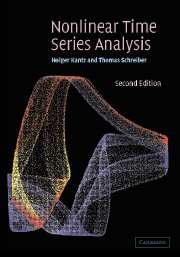Book contents
- Frontmatter
- Contents
- Preface to the first edition
- Preface to the second edition
- Acknowledgements
- I Basic topics
- 1 Introduction: why nonlinear methods?
- 2 Linear tools and general considerations
- 3 Phase space methods
- 4 Determinism and predictability
- 5 Instability: Lyapunov exponents
- 6 Self-similarity: dimensions
- 7 Using nonlinear methods when determinism is weak
- 8 Selected nonlinear phenomena
- II Advanced topics
- A Using the TISEAN programs
- B Description of the experimental data sets
- References
- Index
3 - Phase space methods
Published online by Cambridge University Press: 06 July 2010
- Frontmatter
- Contents
- Preface to the first edition
- Preface to the second edition
- Acknowledgements
- I Basic topics
- 1 Introduction: why nonlinear methods?
- 2 Linear tools and general considerations
- 3 Phase space methods
- 4 Determinism and predictability
- 5 Instability: Lyapunov exponents
- 6 Self-similarity: dimensions
- 7 Using nonlinear methods when determinism is weak
- 8 Selected nonlinear phenomena
- II Advanced topics
- A Using the TISEAN programs
- B Description of the experimental data sets
- References
- Index
Summary
Determinism: uniqueness in phase space
The nonlinear time series methods discussed in this book are motivated and based on the theory of dynamical systems; that is, the time evolution is defined in some phase space. Since such nonlinear systems can exhibit deterministic chaos, this is a natural starting point when irregularity is present in a signal. Eventually, one might think of incorporating a stochastic component into the description as well. So far, however, we have to assume that this stochastic component is small and essentially does not change the nonlinear properties. Thus all the successful approaches we are aware of either assume the nonlinearity to be a small perturbation of an essentially linear stochastic process, or they regard the stochastic element as a small contamination of an essentially deterministic, nonlinear process. If a given data set is supposed to stem from a genuinely non-linear stochastic processes, time series analysis tools are still very limited and their discussion will be postponed to Section 12.1.
Consider for a moment a purely deterministic system. Once its present state is fixed, the states at all future times are determined as well. Thus it will be important to establish a vector space (called a state space or phase space) for the system such that specifying a point in this space specifies the state of the system, and vice versa. Then we can study the dynamics of the system by studying the dynamics of the corresponding phase space points. In theory, dynamical systems are usually defined by a set of first-order ordinary differential equations (see below) acting on a phase space.
Information
- Type
- Chapter
- Information
- Nonlinear Time Series Analysis , pp. 30 - 47Publisher: Cambridge University PressPrint publication year: 2003
Accessibility standard: Unknown
Why this information is here
This section outlines the accessibility features of this content - including support for screen readers, full keyboard navigation and high-contrast display options. This may not be relevant for you.Accessibility Information
- 2
- Cited by
